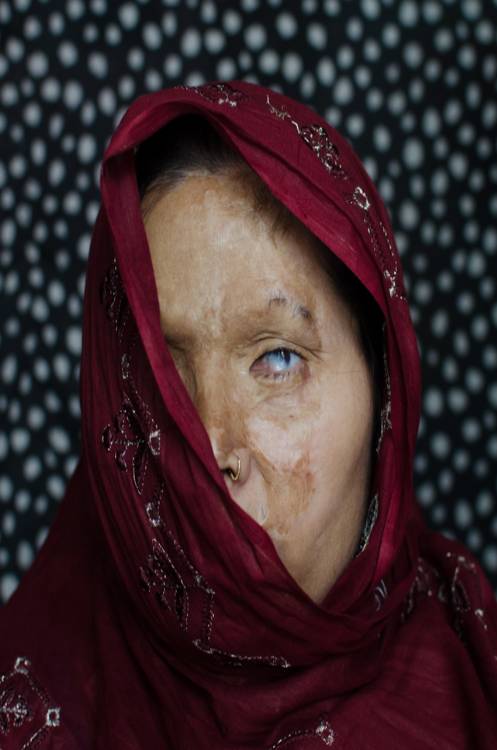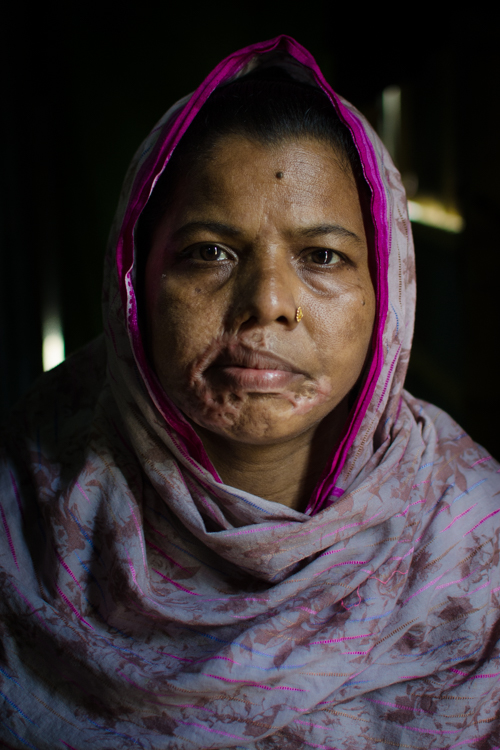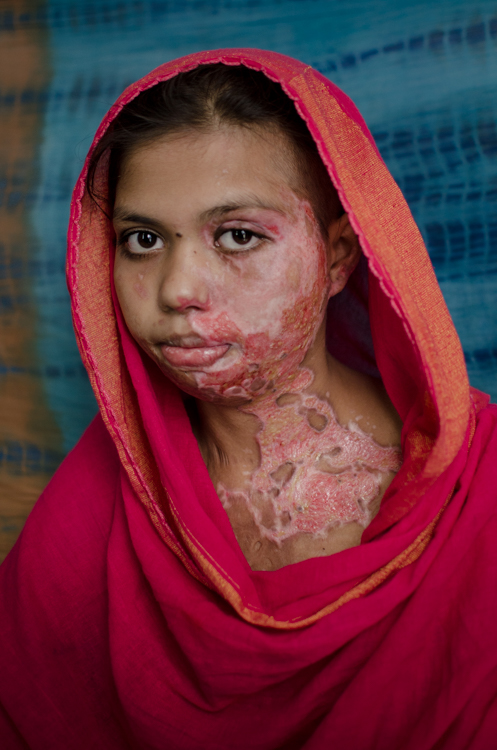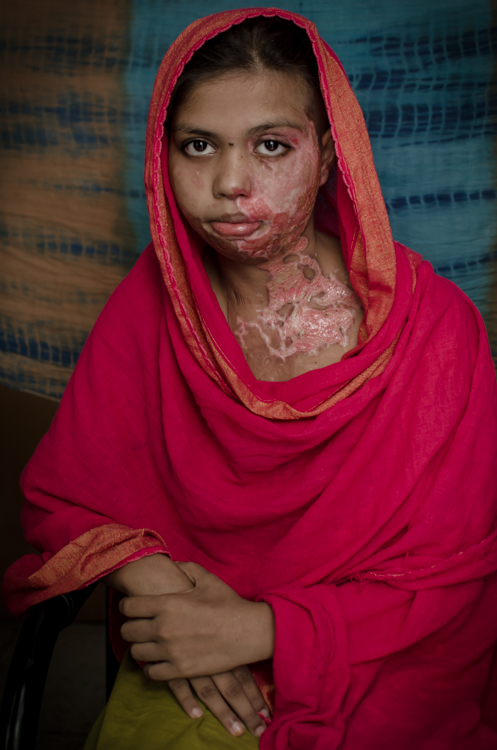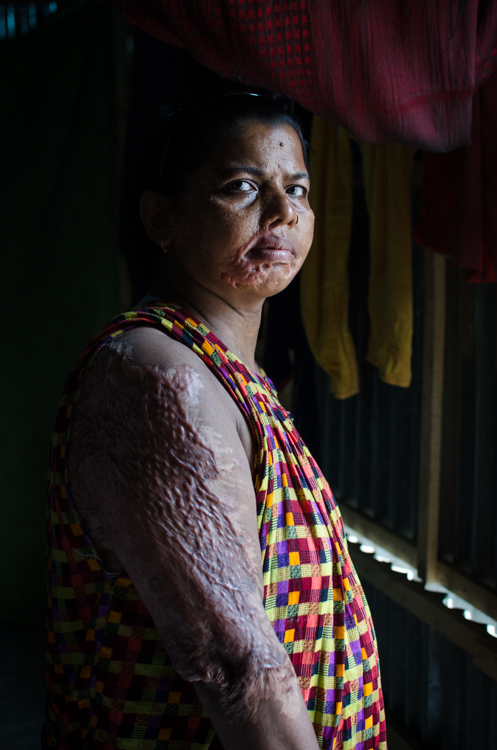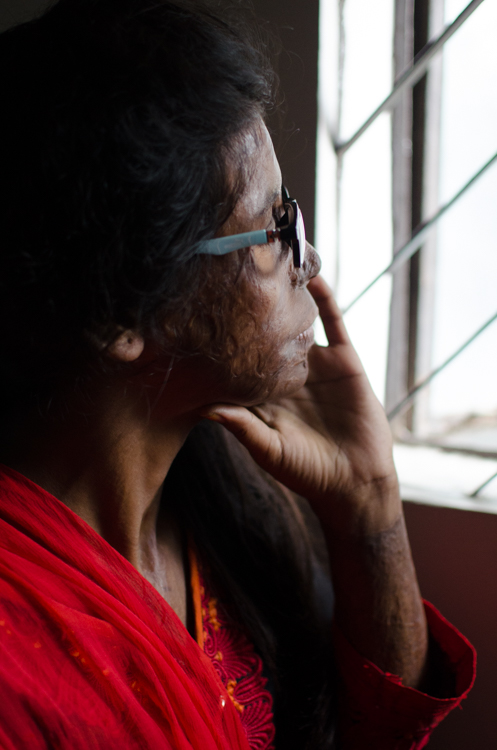Mila’s journey from ‘victim’ to ‘survivor’
Alam Promanik lives with his family of five in Malinagar village, Bogra district and Mihila Alam Mila is his second daughter. Her father was struggling to make ends meet and at the same time ensure with great difficulty that his children continued their education. Mila was 17 years old and preparing to sit for her S.S.C examination when she received a marriage proposal. Impoverished Alam did not want to miss an opportunity to settle his daughter’s life and so on the afternoon of 14th July 2006, young Mila was married to 26 year old Shahidul from the local village of Shikarpur.Mila’s father gave his new groom all the furniture that was needed for their home as a wedding present. But even before the year ended, Mila’s in-laws demanded dowry and began to harass her. But Mila’s father was too poor to fulfill the demands for dowry and as a result the girl’s harassment worsened day by day. Witnessing the dire state of his daughter, in an attempt to free her from these circumstances Mila’s father was forced to sell their milk cow and take out a loan. He managed TK 115,000 to quench the greed of Mila’s husband and in-laws. However, only a little time passed before her husband and his family again began to pressure Mila for dowry. This time Mila was determined to not take any more money from her father. During this Mila also became pregnant and in 2006 she gave birth to a baby boy. She had hoped that after seeing their grandson her in-laws
would not have the heart to demand dowry. This was not the case and the harassment progressively grew worse. Mila reached a point where she could no longer bear the harassment and left with her child to her father’s home. Her father having had enough of Shahidul’s cruel behavior decided to file a case under Women and Children Repression Prevention Act 2000.
Even though Shahidul was arrested because of the case, he was released on bail only a few days later. Now along with the demand for dowry, Shahidul was angry about the case filed against him and he continued to harass Mila. He threatened to take the life of both Mila and her child.
Thus Mila was forced to file for divorce from her husband. At this time Mila started a job as a maid at Ismaili hospital to support herself and her son. One night as she was returning home after her shift, Shahidul along with some others followed her and threw acid on Mila. It was the 9th of August 2010. The acid burned Mila’s shoulders, stomach and the lower part of her body severely. Hearing Mila’s scream of pain her neighbors rushed to her aid and together arranged to pour water on her burns. They urgently took her to Ismaili Hospital and then to Mohammad Ali Hospital. After receiving first aid treatment, Mila with the help of ASF’s local partners Lighthouse and Brac was brought to ASF hospital in Dhaka. At ASF, Mila went through almost one and half months of continuous treatment which included two operations.
When recalling the incident of the acid attack, Mila says that neither she nor her family had even hoped that she would be alive today. Even if had expected to live, she had imagined a life where she would have to live with severe disabilities and great despair and sadness. She thought she would live a life where she would have to depend on people’s kindness and sympathy. But all these anxieties have been proven wrong by ASF.
Through the treatment provided by ASF, Mila was slowly improving physically and also undergoing routine physiotherapy sessions to regain her functional ability. At the same time, ASF’s psychological and social unit arranged for 5 counseling and 2 psychotherapy sessions to help Mila overcome the trauma and reclaim her courage. On 17th September 2010, Mila left ASF to return home.
Immediately after the incident had occurred, Mila’s mother Fatema Begum with legal help from Brac began the proceedings under an acid crime tribunal Shahidul Haque along with his accomplices, Mila’s brother-in-law Shafikul Islam and sister-in-law’s husband Majedur Rahman were all named in the charges. After this tragedy befell Mila her father became ill and bedridden. Her father’s bedridden and disabled state along with the threats
that came from the perpetrators made it very difficult for Mila to remain in her house. At this stage, with the help of Lighthouse Mila was placed in Ain O Shalish Kendro’s shelter house in Dhaka. Light House also arranged quite a few talks and press conferences to lobby for the arrest of Shahidul. As a result, the police arrested the number one suspect of the crime Shahidul Haque on 26th August 2011.
However, the other two accomplices have yet to be arrested and at the moment the case is in proceedings. Almost nine months later when things returned to normal, Mila was able to go back home. But the costs of the case, the bedridden state of her sick father amongst other things had caused Mila’s family to fall into a state of economic despair. ASF with the help of Light House tried to ensure that Mila continued to act with strength and courage upon returning home. ASF and lighthouse arranged three community clinics to sensitize Mila’s community on the difficulties that acid victims may face when returning home and how the community can help the victims overcome these difficulties. Light House also made five house visits to follow up on Mila’s progress. In October 2011, ASF with the help of Light House provided Mila’s family with a milk cow worth TK 33,000 and through the local District, office got her a sewing machine. They also tried to return Mila to her previous job at the Islamia Hospital. But there was no longer an opportunity for Mila to continue working there and so they arranged a job for her as a receptionist at the Shaheen Eye Care Centre that earned her TK. 3,000 per month. Currently, selling cow’s milk along with Mila’s income has allowed her to take the lead of her family and also the responsibility of educating her younger brother. This is how Mila has proved that women do not solely object to marriage and the attainment of dowry. They too have the ability to take on society’s responsibilities. Mila wants to work for the rights of all those who are deprived and in despair as acid victims. Mila wants to rid her society of this heinous crime. She believes that if we all work together and everyone extends a helping hand with good faith, then all of our society’s acid victims will be able to raise their heads with pride. This is why this is not the end of Mila’s story but merely a glimpse into the bright future that lies ahead of her new journey.

